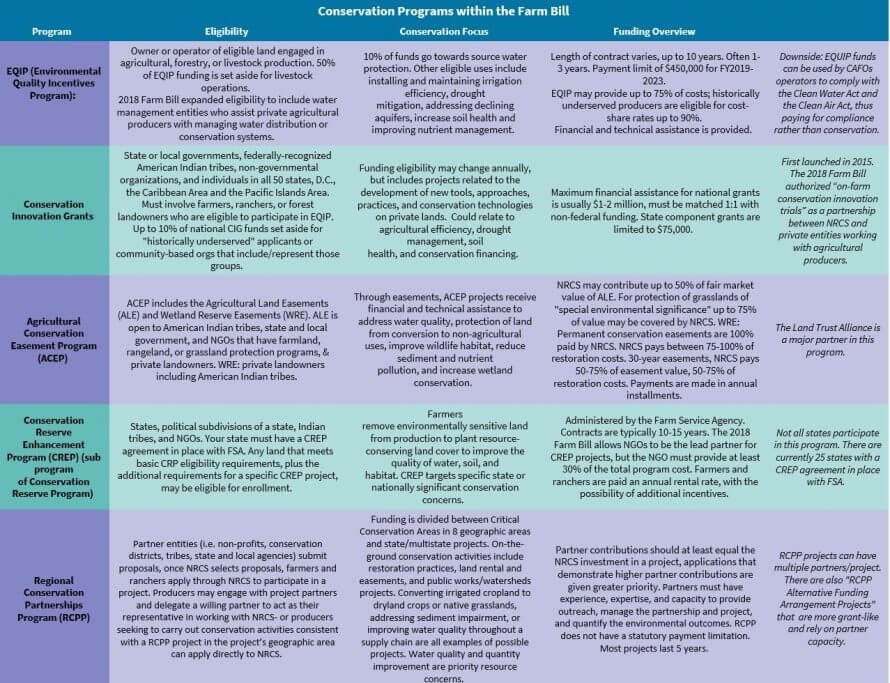What does the Farm Bill have to do with Water Conservation?
A Quick Intro to Federal Conservation Programs on Agricultural Land
River Network’s newly released plan defining our path forward on healthy rivers in agricultural landscapes identifies several needs and challenges that network members brought up in working with agricultural audiences, including:
- Better understanding of funding sources, including federal, state, local and private sources; and how to leverage funding to build capacity and partnerships and implement multi-benefit projects.
- Increasing knowledge of how to use and influence federal and state policies, regulatory tools, and programs that support healthy rivers in agricultural landscapes.
With that in mind, we are exploring federal sources of funding for agricultural conservation related to water and want to share some basics. This blog post focuses on programs within the Farm Bill- and a future blog will cover WaterSMART and other funding opportunities. Does your organization participate in any of these conservation programs? What kind of successes or challenges have you faced? What kind of training or support would you need to partner with farmers or ranchers to address water concerns in your area?
Farm Bill Conservation Programs at a Glance
The Farm Bill is a behemoth- the omnibus legislation addresses several issues including nutrition assistance, crop insurance, support for beginning farmers, rural development, research, and credit programs. It also conserves private lands across the country. Organizations such as the National Sustainable Agriculture Coalition, Theodore Roosevelt Conservation Partnership, and the National Young Farmers Coalition have developed incredibly useful guides, handbooks, and case studies highlighting the conservation opportunities that are found within the bill.
The first Farm Bill passed in 1933 as part of FDR’s New Deal. The Farm Bill is organized into spending categories called “titles.” Title II covers the conservation programs, which were first added in the 1985 bill. The members of the House Committee on Agriculture and the Senate Committee on Agriculture, Nutrition, and Forestry are primarily responsible for writing farm bills. The Appropriations Committees have House and Senate Agricultural Appropriations Subcommittees who set spending levels of discretionary Farm Bill programs, including those under the Conservation title. Reauthorization occurs roughly every five years- the most recent Farm Bill legislation was passed in 2018 and expires in 2023. The United States Department of Agriculture’s (USDA) Natural Resources Conservation Service (NRCS) is the primary agency implementing the conservation programs established in the Farm Bill, though the Farm Service Agency administers some programs. NRCS accepts applications for its conservation programs year-round, but there are state-specific ranking dates.
The following programs are highlighted because of their eligibility requirements- non-profit organizations, water management entities, and/or conservation districts may apply, in partnership with agricultural producers, to access these funds to improve the health of soil, water, and habitat in working lands.
We want to hear from you- do you have a success story of participating in a conservation program through the Farm Bill? What kinds of relationships do you have with NRCS staff? How has your organization collaborated with agricultural producers to address water concerns in your region? And how can River Network support you in stepping into this realm?
Join the Conversation at River Rally
River Rally is heading to Washington, DC June 4-7, 2022! Hosted annually by River Network, River Rally provides an inspiring and energy-infused touchpoint for nonprofit groups from across the US and beyond, as well as for agency and foundation representatives, industry innovators, philanthropists, academics, students, and community leaders. The Water & Agriculture workshop track promises to be chock full of learning and experiential opportunities to dig into these topics more fully. Registration opens in February.







[…] For a brief overview of the conservation programs established through the Farm Bill, check out this blog post. […]